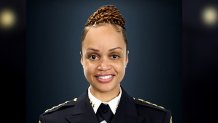The next police commissioner of Philadelphia is Portland, Ore., Police Chief Danielle Outlaw, the first black woman to lead the 6,500-officer department.
Outlaw, 43, served as the top-ranking police official for the West Coast city for a little over two years, since October 2017. She was the first black woman to hold the position there as well. She will begin Feb. 10. Her annual salary is $285,000.
“I think about it all the time. I was also a first in Portland, and quite frankly for a long time, it was a distraction. A lot of people said you got this job because,” Outlaw said, alluding to a notion she didn't earn her promotions. “I’ve been a black woman all my life, and I chose the career of law enforcement. So I happen to be a police officer who’s a black woman. But with that said, I bring a very unique perspective to this role.”
She is now tasked with bringing that fresh outlook to the fourth-largest municipal department in the country, where sexual harassment claims and community angst about criminal justice fairness has undermined integrity in law enforcement.
"I am convinced she has the conviction, courage, and compassion needed to bring long-overdue reform to the Department. After meeting and speaking with her at length, I came away confident that Danielle Outlaw possesses the strength, integrity, and empathy vital to the tasks ahead," Kenney said. “With our support, she will tackle a host of difficult issues, from racism and gender discrimination, to horrid instances of sexual assault on fellow officers. These are issues that too often negatively impact women — especially women of color — within the department."
Her leadership tenure in Portland followed 20 years in the Oakland, Calif., police department. She left Oakland after rising from a patrol officer to deputy chief.
U.S. & World
"While I am new to Philadelphia, I am not new to the challenges of big-city, 21st century policing. I encountered and dealt with the issues of employee health and wellness, equity, contemporary training, crime, fair and just prosecution, community trust, homelessness, substance abuse, police accountability, and innovation and technology — just to name a few — as I worked various assignments and rose through the ranks in Oakland, California," Outlaw said. "And I directly addressed these issues while leading the police force in Portland, Oregon."
She added that "modern policing is data-driven, but the paramount factor is not so easily quantified: trust — the trust residents have that their police force will keep them safe and treat them with respect. I am convinced that trust can be restored, here and across the nation."

Outlaw succeeds Acting Commissioner Christine Coulter, who took over in August after the sudden resignation of Commissioner Richard Ross. The abrupt departure of Ross, who was appointed by Kenney when the mayor took office, sent City Hall on an immediate search for a new top cop.
Kenney’s four-month search was cloaked in darkness, with little information at all from his administration about the hiring process or candidates since August.
He defended the secrecy because of the candidates' current jobs.
Solomon Jones, a writer and activist with the Rally for Justice Coalition, said Kenney's choice of Outlaw addressed his group's biggest demand: a woman of color be hired.
"I’m thrilled the mayor listened when the rally for justice demanded a black woman for police commissioner," Jones said. "We took to the streets over the Facebook posts, demanded hearing at City Council and got them. We are happy our activism caused change and all of that resulted."
Jones said the coalition will be there to provide Outlaw with some community input.
"We know she has experience and that she is going to have support here," Jones said.
The hiring process was an unusual one for a Philadelphia mayor in recent decades, as no commissioner left the post as surprisingly as Ross. The lifelong Philly cop who rose through the ranks assumed the top job in what many political observers suggested as a foregone conclusion. Ross spent years as former Commissioner Charles Ramsey’s second-in-command. His resignation and swift fall from grace came in light of a lawsuit filed by two female officers. They claim that they were sexually harassed and the harassment was never dealt with by department heads. In fact, one of the two plaintiffs has claimed Ross himself was aware of the harassment and did nothing. She alleged that she and Ross had an affair previously.
"I was not compelled to do so," Ross said in August of his resignation. "My love for this city has compelled me to make a decision that is bigger than me."
Kenney promised to begin a search for his replacement immediately, saying that choosing a police commissioner is perhaps his most important job. The search, he said, would be national.
Outlaw is now in charge of a department that, according to some community leaders, is in need of reform both in procedure and training.
More than 70 Philadelphia police officers were cited in a national investigation as having posted racist or inappropriate content on social media. At least 13 of those officers were fired or resigned in the aftermath of the scandal.
Meanwhile, the local Fraternal Order of Police union’s president has sparred publicly with city District Attorney Larry Krasner over probation and bail reforms sought by Krasner in the local criminal justice system.
FOP President John McNesby also publicly bashed one of the city’s biggest football stars, Eagles safety Malcolm Jenkins, after Jenkins penned an opinion piece about reforms needed within the police department and what attributes the next commissioner should hold.
In a statement Monday, McNesby said "our members were hoping for one of the strong, internal candidates to be elevated to the Commissioner's office."
"However, we look forward to a professional, working partnership with Chief Outlaw that includes making our city safer for our residents and our 6,500 police officers, who serve with respect and dedication," he said.
Outlaw has given presentations on modern city policing, including a Tedx talk titled, “Humanity in Authority.”
Her Tedx speech “dispels the belief that the two concepts are contrary in nature and explains how the two concepts can, and should, co-exist.”
Here is the speech from April 21, 2018:



